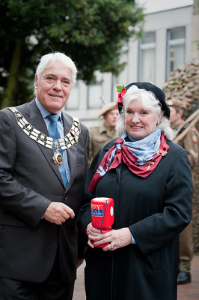Healthy ageing
Exploring and evaluating the War Widows in Touch (WW.it) Programme

The WW.it Programme aims to connect war widow(er)s at a national and local level and build an online community. The evaluation aims to understand the impact and potential sustainability of the programme. This project provides members of the War Widows Association (WWA) with iPads and/or iPad training, with the aim of empowering them to use the devices and learn new skills to connect with others online.
Relevance: Loneliness and social isolation are both national areas of concern, with disappearing social networks and people living further apart being related to this. Members of the WWA are spread throughout the UK and are at risk of experiencing loneliness. Widowhood, particularly in later life, is detrimental to health and wellbeing, and although social relationships are thought to be beneficial in widowhood, this is dependent on the quality and flexibility of ties, as well as access to social support and participation. Enabling people to use technology to support social connections increases the ways in which they can connect with each other online.
Research aim: The WW.it project is being co-ordinated by the WWA. Academics at the Northern Hub for Veterans and Military Families’ Research, Northumbria University, are leading the project evaluation. This evaluation aims to: 1) reflect on what helps and hinders the implementation of the intervention(s) from the perspectives of participants and facilitators; 2) examine the impact of the intervention(s) rom these perspectives: 3) map any perceived changes to social isolation, loneliness and wellbeing.
Research summary: A mixed-method (combining quantitative and qualitative data collection), two-phase .design was adopted in this evaluation study. A review of the existing literature was conducted as part of this project and has explored the implementation and delivery of technology interventions for older adults, from the perspective of those delivering the programmes. Phase one and two involve participants completing self-report questionnaires and interviews. Participants in this study are War Widows aged 65 years-or-older. Under the provisions of the War Disablement and War Widows Pensions Scheme, a person is accepted to be a War Widow if the death of their spouse or partner is a direct result of, is attributable to, or hastened, by their service in the Armed Forces.
Findings: Phase one findings showed that participants have a variety of intentions and reasons for using technology, including: understanding what is possible in using the devices; improving their skills; social inclusion, engagement and participation; independence; and dealing with the impact of COVID-19. The War Widows described a number of personal barriers to participation including: health, confidence, fear and ageing. Other social factors which had an impact on use of technology included: family support with use of technology, and informal peer support from community members and the wider war widows’ community. The learning environment also had an impact on individuals’ use of technology, especially lack of face-to-face contact since the onset of COVID-19. Phase two is still ongoing and final findings will be available from December 2021.
The wider research team: Mrs Jessica Gates (Northumbria University) and Mrs Mary Moreland (Northumbria University).
Funding details: This study, funded by the Armed Forces Covenant Fund Trust, ran from October 2020 and is anticipated to be completed by November 2021.
Image: "War Widows' Association of Great Britain" by Tomas via Flickr.com, copyright © 2009: https://www.flickr.com/photos/8515913@N08/4039377465 (CC BY-NC-ND 2.0).
Last modified: Wed, 08 Dec 2021 15:08:26 GMT





